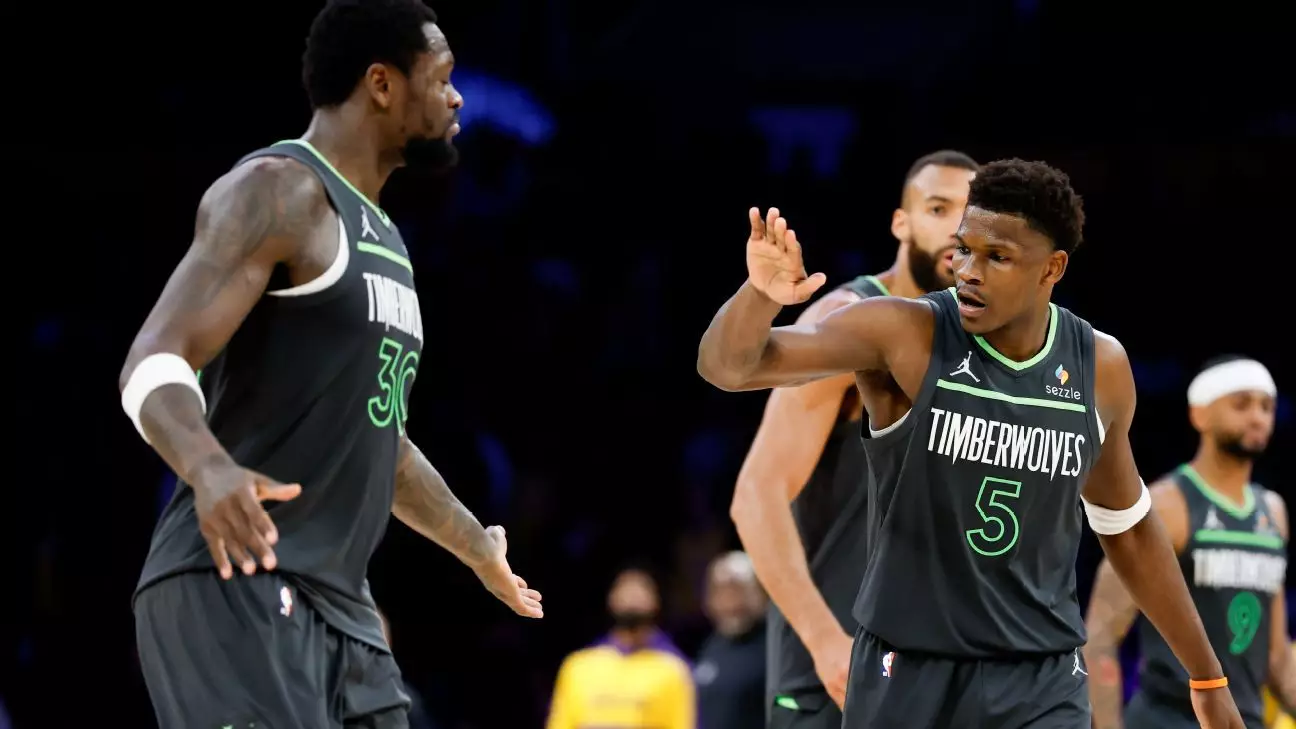In a clash that was as much about grit as it was about sheer skill, the Minnesota Timberwolves defied expectations in Game 5 of their playoff series against the Los Angeles Lakers. While the entire team struggled with shooting accuracy, Rudy Gobert emerged as a titan, delivering a performance that was not only remarkable but significant in the context of his career. With 27 points and 24 rebounds—both playoff career highs—Gobert asserted his dominance and led the Timberwolves to an exhilarating 103-96 victory that propelled them to the Western Conference semifinals. This game, characterized by strategic variances and individual excellence, showcased the Timberwolves’ potential and illustrated the growing pains of their playoff journey.
Gobert’s impressive stats are particularly noteworthy, especially given that they eclipsed his scoring output from the first four games of the series combined. This resurgence came at a crucial moment when the Lakers shifted to a centerless lineup, revealing flaws in their defensive scheme. While many players crumble under playoff pressure, Gobert’s ability to thrive resonates with an integral truth in sports: a champion’s mindset flourishes when the stakes are highest.
What Went Right: Mental Toughness Over Shooting Woes
Despite a dismal shooting performance—finishing just 7-for-47 from beyond the arc—the Timberwolves displayed an indomitable spirit. Coach Chris Finch highlighted this mental toughness as a key to their success. “We didn’t shoot the ball well, but I thought we were the tougher team mentally and physically,” he expressed. This assertion underscores the importance of mental fortitude in sports, especially during playoff scenarios where pressure can often lead to performance anxiety. Even with 17 consecutive misses from the three-point line, the Timberwolves demonstrated resilience, seizing moments that mattered—particularly when Mike Conley sank a crucial three-pointer with just over a minute left in the game.
The Timberwolves’ defense was equally commendable. They effectively neutralized the Lakers’ offensive plays, forcing them into uncomfortable positions. The ability to remain composed amidst adversity is a hallmark of champions, and Minnesota’s performance suggests they are cultivating this quality as their playoff run continues.
Lakers’ Disappointment: A Mixed Bag of Emotions
On the opposite side of the court, the mood was distinctly grim for the Los Angeles Lakers. This second consecutive first-round exit has raised questions about their roster’s synergy and strategic decisions. Their head coach, JJ Redick, reflected a blend of disappointment and respect for their opponents, acknowledging the Lakers’ inability to capitalize on their midseason trades. The high-profile acquisition of Luka Doncic was expected to be a game-changer; however, the outcome has proven otherwise. The Lakers needed more than individual brilliance to make a deep playoff run; they required cohesive teamwork and adaptability, particularly against a fierce Timberwolves squad that demonstrated they would not back down easily.
The statistics from the Lakers’ key players, including James and Doncic, present a mixed narrative. While James scored 22 points and Doncic posted 28 points with nine assists, their efforts weren’t enough to turn the tide against Minnesota’s resilience. Rui Hachimura’s contribution of 23 points was also overshadowed by the lack of overall team performance, painting a stark picture of a team that faced difficulties translating talent into victory.
Minnesota’s Moment: A New Era in Timberwolves Basketball
The Timberwolves’ triumph over a storied franchise like the Lakers carries weight and significance. This victory marks the first time the team has won a playoff round in consecutive seasons—a milestone that signifies growth, both for the players and for the organization as a whole. As they advance to face the winner of the Houston-Golden State series, the Timberwolves’ confidence will undoubtedly be bolstered by their recent successes.
However, the journey is far from over. If they are to make a serious run for the championship, they must hone their shooting abilities and continue to capitalize on their defensive strengths. The blend of youth and experience can serve as both a challenge and an advantage, and how they balance that moving forward will determine their ultimate success.
Rudy Gobert’s performance in Game 5 has not only proven his capabilities but has also instilled a belief that the Timberwolves can compete with the best. The timeliness of their resilience, combined with a newfound determination, may signify a shift in not just the franchise’s fate but potentially the landscape of the Western Conference. The Timberwolves of today are no longer merely participants in the playoffs; they are emerging as serious contenders, and the basketball world is taking note.

